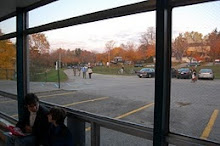Senator Hillary Rodham Clinton lined up with Senator John McCain, the presumptive Republican nominee for president, in endorsing a plan to suspend the federal excise tax on gasoline, 18.4 cents a gallon, for the summer travel season. But Senator Barack Obama, Mrs. Clinton’s Democratic rival, spoke out firmly against the proposal, saying it would save consumers little and do nothing to curtail oil consumption and imports.A gas tax holiday is blatant pandering. It encourages the very activity that is the problem: consuming fuel. If we want to offset people's increased energy costs, why not give people their $30 (estimated benefit to the average motorist) regardless of whether they use fuel?
While Mr. Obama’s view is shared by environmentalists and many independent energy analysts, his position allowed Mrs. Clinton to draw a contrast with her opponent in appealing to the hard-hit middle-class families and older Americans who have proven to be the bedrock of her support. She has accused Mr. Obama of being out of touch with ordinary Americans who are struggling to meet their mortgages and gas up their cars and trucks.
I use a bicycle for my transportation. I can only get my $30 worth of benefit from this if I decide to go on a car trip. The more fuel you burn, the more you save.
McCain and Clinton both support a gas tax holiday, but Clinton takes it even a step further. She wants to increases taxes on oil company earnings. The problem in question is we're consuming more oil than we're extracting. Clinton's proposed solutions increase consumption and discourage oil extraction. Clinton's energy policy gimmicks couldn't be any stupider if she tried. I guess she's trying to exploit people's ambivalence in which they love the product but hate the people who provide it.
The only good thing about these pandering proposals is they won't really do much. The tax holiday wouldn't cost that much. Demand for gasoline is inelastic enough that consumption won't really increase significantly. Her proposal to tax oil companies' profits more than other companies', if somehow a significant tax increase passed, would cause oil prices to rise further and hasten the transition to other energy sources. I don't think that's the intention. She's probably proposing just a token tax, not enough really to affect after tax earnings and depress the share price.
Obama correctly identifies that we need a plan to reduce our oil use. The gimmicks are all about symbolism. Clinton and McCain using symbolism to show they're willing to pander, while Obama shows a willingness to talk about the larger problem. I do not support any candidate for president, but on this one non-issue, Obama is the only one showing the leadership I would expect from a president.

